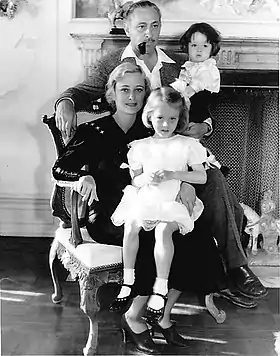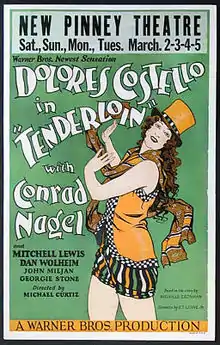Dolores Costello | |
|---|---|
 Costello in 1926 | |
| Born | September 17, 1903 Pittsburgh, Pennsylvania, U.S. |
| Died | March 1, 1979 (aged 75) Fallbrook, California, U.S. |
| Resting place | Calvary Cemetery (East Los Angeles, California) |
| Occupation | Actress |
| Years active | 1909–1943 |
| Spouses | |
| Children | 2, including John Drew Barrymore |
| Parent(s) | Maurice Costello Mae Costello |
| Relatives | Helene Costello (sister) Drew Barrymore (grand-daughter) |
Dolores Costello (September 17, 1903[1][note 1] – March 1, 1979)[2][3] was an American film actress who achieved her greatest success during the era of silent movies. She was nicknamed "The Goddess of the Silent Screen" by her first husband, the actor John Barrymore. She was the mother of John Drew Barrymore and grandmother of actress and talk show host Drew Barrymore.
Early years
Dolores Costello was born in Pittsburgh, Pennsylvania, the daughter of actors Maurice Costello[2] and Mae Costello (née Altschuk). She was of Irish and German descent. She had a younger sister, Helene, and the two made their early film appearances from 1909 to 1915 as child actresses for the Vitagraph Film Company. They played supporting roles in several films starring their father, who was a popular matinee idol at the time.
Film career


The two sisters appeared on Broadway together as chorines, and their success resulted in contracts with Warner Bros. Pictures. In 1926, following small parts in feature films, Dolores Costello was selected by John Barrymore to star with him in The Sea Beast,[4] a loose adaptation of Herman Melville's Moby-Dick, after which Warner soon began starring her in her own vehicles. Meanwhile, she and Barrymore became involved romantically, and married in 1928.[2]
Within a few years of achieving stardom, Costello had become a film personality in her own right. As a young adult, her career developed to the degree that in 1926, she was named a WAMPAS Baby Star,[5] and had acquired the nickname "The Goddess of the Silver Screen".
Warners alternated Costello between films with contemporary settings and elaborate costume dramas. In 1927, she was re-teamed with John Barrymore in When a Man Loves, an adaptation of Manon Lescaut. In 1928, she co-starred with George O'Brien in Noah's Ark, a part-talkie epic directed by Michael Curtiz.

Costello spoke with a lisp and found it difficult to make the transition to talking pictures, but after two years of voice coaching she was comfortable speaking before a microphone. One of her early sound film appearances was with her sister Helene in the Warner Bros. all-star extravaganza The Show of Shows (1929).
Her acting career became less a priority for her following the birth of her first child, Dolores Ethel Mae "DeeDee" Barrymore, on April 8, 1930, and she retired from the screen in 1931 to devote time to her family. Her second child, John Drew Barrymore, was born on June 4, 1932, but the marriage proved difficult due to her husband's increasing alcoholism, and they divorced in 1935.[6][7]
She resumed her career a year later and achieved some successes, most notably in Little Lord Fauntleroy (1936), and The Magnificent Ambersons (1942). She retired permanently from acting following her appearance in This Is the Army (1943), again under the direction of Michael Curtiz.
Making a rare radio appearance, Costello appeared as the Danish Countess Elsa on the radio program Suspense on August 28, 1943. The title of the episode was The King's Birthday, written by Corporal Leonard Pellitier, U.S. Army.
Later years
In 1939, she married Dr. John Vruwink, an obstetrician who was her physician during her pregnancies, but they divorced in 1950. Costello spent the remaining years of her life in semi-seclusion, managing an avocado farm. Her film career largely was ruined by the destructive effects of early film makeup, which ravaged her complexion too severely to camouflage.[8][9] Her final film was This Is the Army (1943). In the 1970s, her house was inundated in a flashflood that caused a good deal of damage to her property and memorabilia from her movie career and life with John Barrymore.
Costello has a star on the Hollywood Walk of Fame for her contributions to motion pictures at 1645 Vine Street.[10]
Filmography
Child roles
Costello appeared as a child actress in many films made from 1909 to 1915. Among them are:
| Year | Film | Source |
|---|---|---|
| 1909 | A Midsummer Night's Dream | |
| 1910 | The Telephone | |
| 1911 | Consuming Love, or St. Valentine's Day in Greenaway Land a Geranium | |
| 1911 | The Child Crusoes | |
| 1911 | His Sister's Children | |
| 1911 | A Reformed Santa Claus | |
| 1911 | Some Good in All | |
| 1912 | Captain Jenks' Dilemma | |
| 1912 | The Meeting of the Ways | |
| 1912 | For the Honor of the Family | |
| 1912 | She Never Knew; Lulu's Doctor | |
| 1912 | The Troublesome Step-Daughters | |
| 1912 | The Money Kings | |
| 1912 | A Juvenile Love Affair | |
| 1912 | Wanted...a Grandmother | |
| 1912 | Vultures and Doves | |
| 1912 | Her Grandchild | |
| 1912 | Captain Barnacle's Legacy | |
| 1912 | Bobby's Father | |
| 1912 | The Irony of Fate | |
| 1912 | The Toymaker | |
| 1912 | Ida's Christmas | |
| 1913 | A Birthday Gift | |
| 1913 | The Hindoo Charm | |
| 1913 | In the Shadow | |
| 1913 | Fellow Voyagers | |
| 1914 | Some Steamer Scooping | |
| 1914 | Etta of the Footlights | |
| 1914 | Too Much Burglar | |
| 1915 | The Evil Men Do |
Adult roles

She restarted her movie career in 1923 after spending several years modeling in New York.
| Year | Film | Role | Director | Notes |
|---|---|---|---|---|
| 1923 | The Glimpses of the Moon | bit part | Allan Dwan | Lost film |
| Lawful Larceny | Nora the maid | Allan Dwan | Lost film | |
| 1925 | Greater Than a Crown | Isabel Frances / Princess of Lividia | Roy William Neill | |
| Bobbed Hair | Bit part | Alan Crosland | ||
| 1926 | Mannequin | Joan Herrick | James Cruze | |
| The Sea Beast | Esther Harper | Millard Webb | ||
| Bride of the Storm | Faith Fitzhugh | J. Stuart Blackton | Lost film | |
| The Little Irish Girl | Dot Walker | Roy Del Ruth | Lost film | |
| The Third Degree | Annie Daly | Michael Curtiz | A copy is preserved at the Library of Congress | |
| 1927 | When a Man Loves | Manon Lescaut | Alan Crosland | |
| A Million Bid | Dorothy Gordon | Michael Curtiz | An incomplete copy is held at the Library of Congress with Italian intertitles | |
| Old San Francisco | Dolores Vasquez | Alan Crosland | Copies held at the Library of Congress, George Eastman House and Wisconsin Center for Film and Theater Research | |
| The Heart of Maryland | Maryland Calvert | Lloyd Bacon | An incomplete copy is held at the Library of Congress | |
| The College Widow | Jane Witherspoon | Archie Mayo | Lost film | |
| 1928 | Tenderloin | Rose Shannon | Michael Curtiz | Lost film |
| Glorious Betsy | Betsy Patterson | Alan Crosland | Preserved at the Library of Congress, while its Vitaphone track survives incomplete at the UCLA Film and Television Archive | |
| Noah's Ark | Marie/Miriam | Michael Curtiz | Film survives as a partially restored 108 minute version; the original 138 minute version is lost | |
| 1929 | The Redeeming Sin | Joan Billaire | Howard Bretherton | Lost film |
| Glad Rag Doll | Annabel Lee | Michael Curtiz | Lost film Trailer survives | |
| Madonna of Avenue A | Maria Morton | Michael Curtiz | Lost film | |
| Hearts in Exile | Vera Zuanova | Michael Curtiz | Lost film | |
| The Show of Shows | Meet My Sister number | John G. Adolfi | Survives in black and white copy, fragments of color segments exist | |
| 1930 | Second Choice | Vallery Grove | Howard Bretherton | Lost film |
| 1931 | Expensive Women | Constance "Connie" Newton | Hobart Henley | Preserved at the Library of Congress |
| 1936 | Little Lord Fauntleroy | "Dearest" Erroll | John Cromwell | |
| Yours for the Asking | Lucille Sutton | Alexander Hall | ||
| 1938 | The Beloved Brat | Helen Cosgrove | Arthur Lubin | |
| Breaking the Ice | Martha Martin | Edward F. Cline | ||
| 1939 | King of the Turf | Eve Barnes | Alfred E. Green | |
| Whispering Enemies | Laura Crandall | Lewis D. Collins | ||
| Outside These Walls | Margaret Bronson | Ray McCarey | ||
| 1942 | The Magnificent Ambersons | Isabel | Orson Welles | |
| 1943 | This Is the Army | Mrs. Davidson | Michael Curtiz | |
| 1980 | Hollywood (documentary) | Herself | her scenes broadcast posthumously |
Notes
- ↑ Costello's obituary in The New York Times says that she was born on September 17, 1905.
References
- ↑ Shulman, Terry Chester (2019). "Film's First Family: The Untold Story of the Costellos (Screen Classics)" · University Press of Kentucky, 2019 ·ISBN 0-8131-7810-X
- 1 2 3 Flint, Peters B. (March 3, 1979). "Dolores Costello, 73, Film Star". The New York Times. Archived from the original on September 29, 2017. Retrieved September 29, 2017.
- ↑ Motion Picture Performers. A bibliography of magazine and periodical articles, 1900–1969; compiled by Mel Schuster. Metuchen, NJ: Scarecrow Press, 1971.
- ↑ Rainho, Manny (March 2015). "This Month in Movie History". Classic Images (477): 26.
- ↑ Brody, Richard (June 18, 2009). "Stars Are Born". The New Yorker. Retrieved July 23, 2020.
- ↑ "John Drew Barrymore". Syracuse Post Standard. November 30, 2004. Retrieved July 23, 2020.
- ↑ "WIFE DIVORCES JOHN BARRYMORE; Former Dolores Costello, Charging Desertion, Gets Children and $163,000 in Securities". The New York Times. October 10, 1935. Retrieved July 23, 2020.
- ↑ Olive Borden: The Life and Films of Hollywood's Joy Girl by Michelle Vogel page 89; Retrieved February 10, 2016
- ↑ Orson Welles: A Biography by Barbara Leaming page 222; Retrieved February 10, 2016
- ↑ "Dolores Costello". Hollywood Walk of Fame. Archived from the original on February 18, 2014. Retrieved October 3, 2023.
External links
- Dolores Costello photo gallery
- Dolores Costello at IMDb
- Dolores Costello at the Internet Broadway Database
- Dolores Costello at Find a Grave
- Photographs of Dolores Costello
- Dolores and Anita Louise with the legendary Daniel Frohman in 1936 at Actors Fund Benefit (Corbis Images)